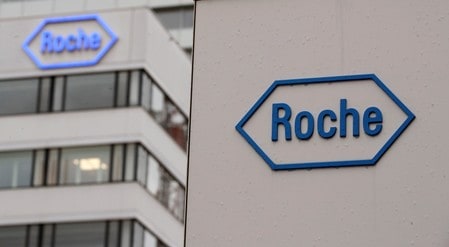By John Miller
ZURICH (Reuters) – Roche Holding and partner AC Immune SA called a halt to two late-stage clinical trials of their crenezumab drug for early Alzheimer’s, the latest in a string of failures to find a treatment for the progressive brain disease.
The announcement from Roche and its Swiss-based partner AC Immune came after an interim analysis indicated it was unlikely to be effective, the Swiss drugmaker said on Wednesday. Nasdaq-listed shares of AC Immune fell 65 percent in response.
Alzheimer’s, a fatal disease which affects memory and language as it progresses, is a compelling target for drugmakers as the numbers affected across the globe swell with an ageing population, but experimental Alzheimer’s drugs have had a dismal track record, with more than 100 failures.
About 5.7 million Americans are living with Alzheimer’s and the number is projected to rise to nearly 14 million by 2050, according the U.S. Alzheimer’s Association.
Drugmakers such as Eli Lilly, AstraZeneca Plc and Johnson and Johnson have all abandoned trials testing their experimental drugs.
The trial failures have undermined the so-called amyloid beta, or abeta, treatment hypothesis, in which protein plaques in the brain are believed to play a pivotal role in the disease.
Roche said an Alzheimer’s Prevention Initiative (API) study of crenezumab among healthy individuals with a genetic disposition to develop the disease in Colombia would continue.
Roche added it remained committed to ongoing clinical studies of Alzheimer’s disease, including separate late-stage trials with gantenerumab and a mid-stage anti-tau trial.
Crenezumab was discovered by AC Immune and is being developed by Roche under a license agreement.
AC Immune Chief Executive Officer Andrea Pfeifer said the company was “extremely disappointed” and the readout might provide evidence that beta amyloids need to be used during earlier stages of the disease to be effective.
“Monotherapy might only be applicable in very earlier populations. In later stage populations… we have to think about combination therapy,” she said in a phone interview, adding that the Colombia trial should shed light on that.
Roche shares were largely unchanged.
Shares of companies who are still developing Alzheimer’s treatments, including Biogen Inc, were down in early trading.
Biogen and Eisai’s amyloid-based Alzheimer’s treatment was last year shown to slow cognitive decline at the highest dose tested but investors voiced doubt the results were strong enough to translate into commercial success.
AC Immune, which specializes in neurodegenerative disease, is also working on different Alzheimer’s treatments, known as anti-tau drugs, a field that has attracted drug majors such as Merck & Co . “This latest failure is yet another setback for the anti-Abeta hypothesis and could also impact others working in this space,” Brokerage Jefferies analysts wrote in a client note.
Regulators announced plans last year to encourage testing of medicines for early stage Alzheimer’s and help pharmaceutical companies win approval for drugs to treat the disease.
James Pickett, head of research at the UK-based Alzheimer’s Society charity, said it was “hugely disappointing” to hear that another drug trial for Alzheimer’s had failed, but added; “We’re far from losing hope”.
“Increasingly, research shows us that while amyloid plays an important part in Alzheimer’s, it’s not the only issue,” he said in an emailed statement.
(Additional reporting by Michael Shields in Zurich, Kate Kelland in London, Ludwig Burger in Frankfurt and Manas Mishra in Bengaluru; editing by Maria Sheahan and Elaine Hardcastle)



